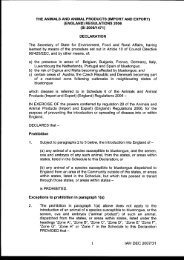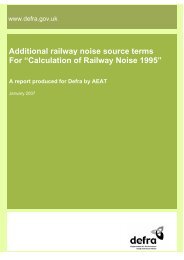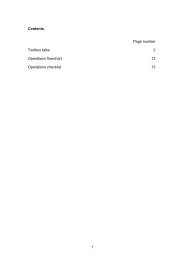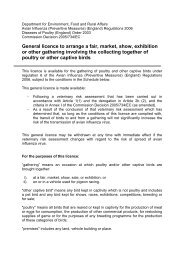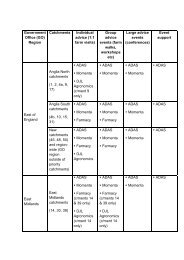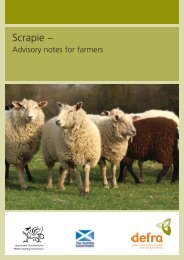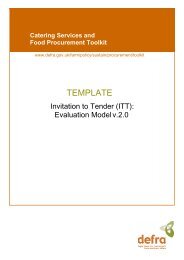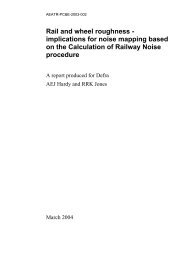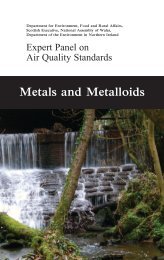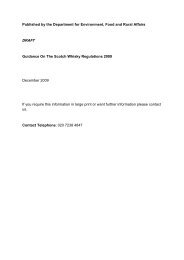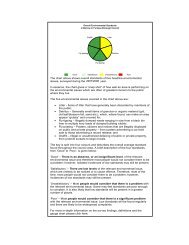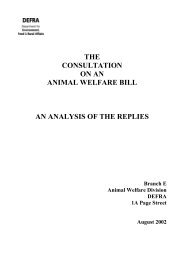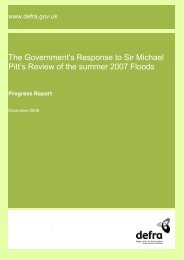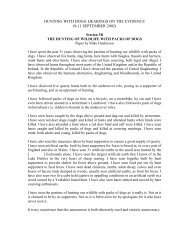Review of the Food-borne Zoonoses Research ... - ARCHIVE: Defra
Review of the Food-borne Zoonoses Research ... - ARCHIVE: Defra
Review of the Food-borne Zoonoses Research ... - ARCHIVE: Defra
Create successful ePaper yourself
Turn your PDF publications into a flip-book with our unique Google optimized e-Paper software.
Project code: OZ0606<br />
Project title: Protective immunity and competitive exclusion in<br />
development <strong>of</strong> effective intervention products for<br />
poultry.<br />
Start date (dd/mm/yy): 01/04/2001<br />
End date (dd/mm/yy): 31/03/2004<br />
£232,145.00<br />
Total cost:<br />
Affiliation: Veterinary Laboratories Agency<br />
Sub-contractor(s):<br />
Project code: OZ0614<br />
Project title: To develop vaccination approaches to <strong>the</strong> control <strong>of</strong><br />
Campylobacter in poultry.<br />
Start date (dd/mm/yy): 01/04/2006<br />
End date (dd/mm/yy): 31/03/2009<br />
£267,629.00<br />
Total cost:<br />
Affiliation: Veterinary Laboratories Agency<br />
Sub-contractor(s):<br />
Abstract <strong>of</strong> research<br />
Campylobacter jejuni is <strong>the</strong> leading cause <strong>of</strong> bacterial enteritis in <strong>the</strong> UK. The handling<br />
and/or consumption <strong>of</strong> contaminated poultry meat is believed to be a risk factor. The<br />
avian intestine is considered <strong>the</strong> natural environment for <strong>the</strong> organism, and up to 90% <strong>of</strong><br />
poultry flocks in <strong>the</strong> UK are colonised asymptomatically. Thus, reduction or elimination <strong>of</strong><br />
<strong>the</strong> organism in poultry in order to reduce <strong>the</strong> number <strong>of</strong> human cases is an objective <strong>of</strong><br />
<strong>Defra</strong> and FSA. A number <strong>of</strong> intervention strategies have been proposed, including<br />
increased bio-security, vaccination and competitive exclusion (CE). Increased biosecurity<br />
alone has so far failed to consistently reduce <strong>the</strong> extent <strong>of</strong> colonisation, so a<br />
multi-pronged approach would seem to <strong>of</strong>fer <strong>the</strong> most promise. Understanding host and<br />
bacterial factors associated with colonisation should enable <strong>the</strong> development <strong>of</strong> defined,<br />
targeted interventions. Early <strong>Defra</strong>-funded work at VLA (project OZ0129) demonstrated<br />
that, despite being considered a commensal in chickens, C. jejuni elicits strong humoral<br />
responses and that exposure can lead to a protective immunity. This work was fur<strong>the</strong>red<br />
in project OZ0606 by investigating <strong>the</strong> feasibility <strong>of</strong> vaccination. Work was also<br />
undertaken to identify bacterial factors essential for colonisation. In addition, following on<br />
from an earlier project (OZ0603) <strong>the</strong> potential for CE by homologous and heterologous<br />
organisms was investigated. Results from this project indicated that vaccination was an<br />
area worthy <strong>of</strong> fur<strong>the</strong>r research, leading to <strong>the</strong> funding <strong>of</strong> OZ0614 which focuses entirely<br />
on this area <strong>of</strong> intervention.<br />
77



